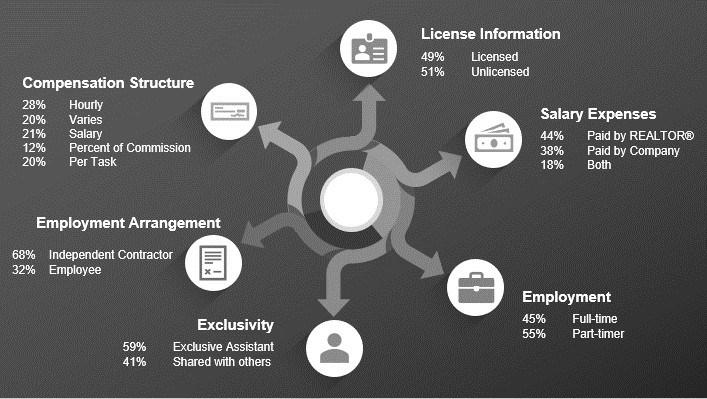
8 minute read
Module 2: The Real Estate Industry 22
Fair Housing
There are a large range of regulations and laws that govern the real estate agent, but one prevailing legislation is the Fair Housing regulation. Professional assistants will need to be diligent to protect consumers by treating all parties fairly on behalf of their team and firm. Consistent practices with all clients regardless of their protected status will be a good liability practice.
▪ Protected Classes
Fair housing laws are federal, but many provinces and localities have adopted more restrictive protected classes in addition to the federal regulations. The REALTOR® Code of Ethics also outlines additional duties to REALTORS® in addition to the regulatory codes, which includes an obligation to treat parties fairly based on sexual orientation. The following federal seven protected classes exist.
1. Race 2. Colour 3. Religion 4. National Origin 5. Sex 6. Disability 7. Family Status 8. Support animals
▪ Classification of Fair Housing Violations
▪ Steering is the act of alienating or discouraging a particular type of housing or geographic area based on the protected class of the client or residents who live in the area in question.
▪ Blockbusting is the act of attempting to manipulate sellers to sell or lower their price based on the fear of a particular type of race or person moving into the area.
▪ Redlining is the practice by mortgage or insurance companies to charge different rates for their services based on the racial makeup of a given area.
Working with Buyers and Sellers
Understanding Agency
Each province has its own agency laws that set forth the duties that real estate professionals owe to their clients and what disclosures need to be made to the clients.
Implied agency is when the client and agent act as a reasonable person would anticipate an agent and client to behave. An agent who offers services to a buyer, seller, landlord or tenant and a client who agrees to avail themselves of those services are deemed to have established an “agency” relationship. The alternative to an implied agency relationship is an expressed agency, where the parties not only act as client and agent but have also entered into a written agreement to memorialize that relationship. Some provinces require that some or all agency relationships be reduced to writing in order to be lawful.
Exclusive agreements are those agency agreements that require the agent and client to work together,and the client may only work with the agent or firm named in the written agreement. To not do so mayrequire the client to pay the agent a fee or commission, regardless of who assisted the client in buyingor selling. Non-exclusive agreements are agency agreements in which the client is free to work with other agents and whichever agent.
▪ Agency Relationships
Consumers are divided into three groups in order to establish what duties, if any, an agent is obligated to provide to each party.
Clients
Customers
Non-Client
These individuals enjoy the highest standard of care from an agent. Clients are currently working with an agent to serve their real estate needs. Whether expressed or implied, there is an agency relationship and commitment by each party to work together.
These individuals are either currently in a real estate transaction or are seeking to enter into an agency relationship but have not yet agreed to be represented by an agent.
This is a party in a real estate transaction who is not represented by an agent. The homeowner selling their homes as a FSBO would be considered a non-client. Generally, an agent would have a non-client sign a disclosure or agreement to go unrepresented in a transaction.
4 Types of Agency Relationships
Seller Agency
A Seller’s Agency represents exclusively the seller’s interest in a real estate transaction
Buyer Agency A buyer’s agent represents the interests exclusively of the buyer in a real estate transaction.
Dual Agency
Designated Agency
A buyer’s agent shows a property to a buyer that is also represented by that agent’s firm, or when a listing agent shows a property to a buyer that is also represented by the same firm.
In some provinces it is permissible for a real estate agent to represent both the buyer and the seller at the same time in same transaction. This is considered “dual” agency. The agent is very limited in what services, advice, and negotiations they can offer these parties as the agent is prohibited from taking any action that puts one party in a better position than the other party.
The real estate firm will designate a salesperson to represent the buyer and another salesperson to represent the seller – even though each of the salespeople are from the same firm.
Agency relationships with clients are relationships between the client and the firm or Principal Broker. The agent is the party caring for and servicing the client on behalf of the firm. When the firm is representing both the buyer and seller, but each client has a different agent in the firm assisting them this is called “designated” agency because the broker has permitted or designated agents to represent each party.
The Fiduciary Relationship
Once an agency relationship is established there are both fiduciary or statutory duties that an agent owes their client and are dictated by each province. These duties are called “agency duties” and are designed to ensure that the agent and client are aware of what can be expected from a salesperson or broker. The province governs the actions of the agents and can discipline the agent for not adhering to theduties as outlined by each provinces law.
The relationship between a real estate agent and a client is called a fiduciary relationship. Fiduciary means faithful servant, and an agent is a fiduciary of the client. In real estate, a broker or a salesperson can be the agent of a seller or a buyer.
OLD CAR – Fiduciary Duties
The technical name or category of agency duties vary from province to province, but they basically all have the same fundamental functionality. The acronym ‘Old Car’ is an easy way to remember these duties:
O Obedience Agents must obey all lawful orders and instructions that the client gives them.
L Loyalty Agents owe undivided loyalty to the client and put the client’s interests above their own.
D Disclosure Agents must disclose to the client any information they receive that may benefit the client’s position in a negotiation.
C Confidentiality
A Accounting
Agents must keep confidential any information given to them by their client, especially information that may be damaging to the clients in a negotiation.
Agents must account for all funds entrusted to them and not comingle (combine) client/customer funds with their personal and/or business funds.
R Reasonable Care
Agents must use all their skills to the best of their ability on behalf of the client.
Customer Service Agreements
Customer service agreements are documents that create a contractual agreement between a real estate firm and a client. The customer service agreement outlines the types of services that a real estate agent will provide to their client.
In most provinces a customer service agreement is required in order to disclose to the client what services and what limitations the agent may have relative to their license. Customer service agreements need to stipulate the types of services being offered, how much the service will cost the consumer, how the agent is to be compensated, when the relationship expires and any associated regulations that are imposed on the client because they are working with a licensed agent.
Examples of customer service agreements include:
▪ Sale or Rental Listing Agreements ▪ Buyer Representation Agreements ▪ Property Management Agreements ▪ Tenant Representation Agreements ▪ Independent Contractor Agreements
Confidentiality is Essential
Many buyers and sellers feel that trust is a primary consideration when choosing an agent. The REALTOR® Code of Ethics and every provincial law requires the agent to keep certain facts and information confidential about their client and their client’s position in the transaction.
Professional assistants will be bound by this same level of confidentiality. Releasing information about a client that relates to their personal lives, financial position, or information that the client may deem confidential could be a breach of the law and also put the client at a disadvantage during negotiations.
Inquiries regarding clients, their motives or any information that isn’t readily available on a public platform should be referred to the agent representing the client and not answered by the professional assistant.
Pre-Listing Packets – Analog or Digital
The use of an analog or digital pre-meeting packet will ensure that a client keeps their appointment with the agent and gets to know the agent and their offerings before the physical meeting.
Not all agents prefer digital pre-meeting packets. Having a tangible packet of information to deliver to the seller prior to the listing appointment can be an impressive gesture to the seller and help to set the stage for the listing meeting. When time permits the pre-listing packet should be delivered a day or two before the actual meeting. A pre-listing packet can have an assortment of materials in it, here is a list of some common elements for a pre-listing packet.

Listing Packets
Listing packets work in concert with pre-listing packets. Listing packets accompany the agent to the listing appointment and serves as visual aids in addition to the listing agent’s digital presentation, which is often done on a laptop or tablet.
The listing packet should have high quality materials that reflect well on the agent and shows the seller the quality of work that the agent and their team will do in the future. Listing packets can also have a wide range of materials, but some of the most common elements include:

Buyer Packet
The buyer’s packet is similar to the listing packet and is designed to assist the agent with their buyer counseling session, which usually occurs at the first meeting. The buyer packet should have resources for the buyer to better understand the buying process, materials to demonstrate the agent’s value to the buyer, information about the area and other resources. The packet should establish the agent as an undeniable resource to any buyer. Some of the additional elements one might include in a buyer packet include:











